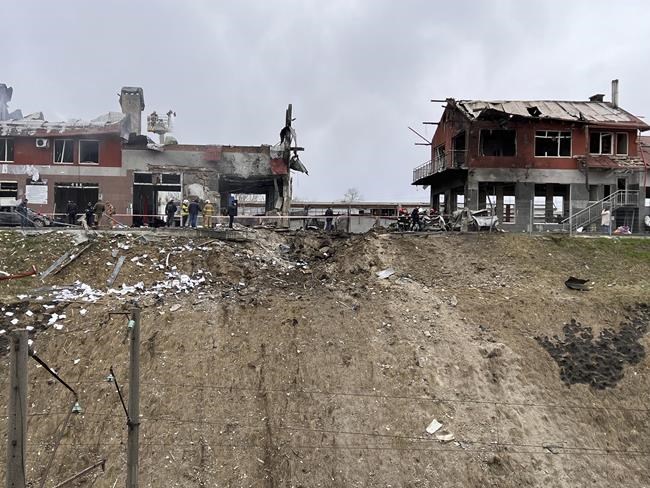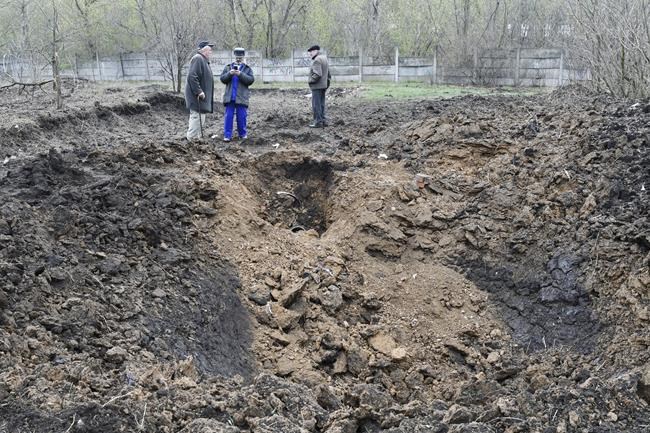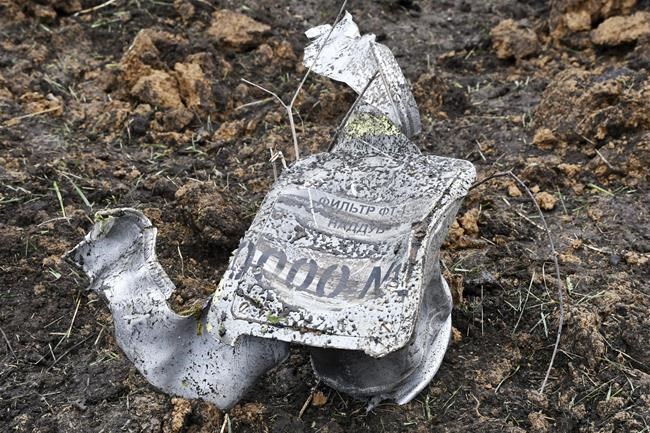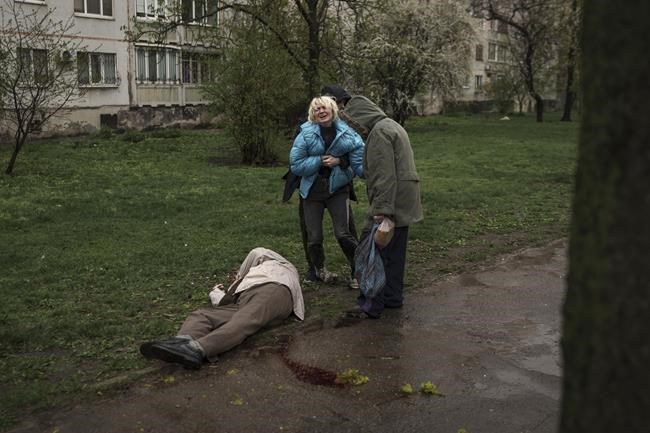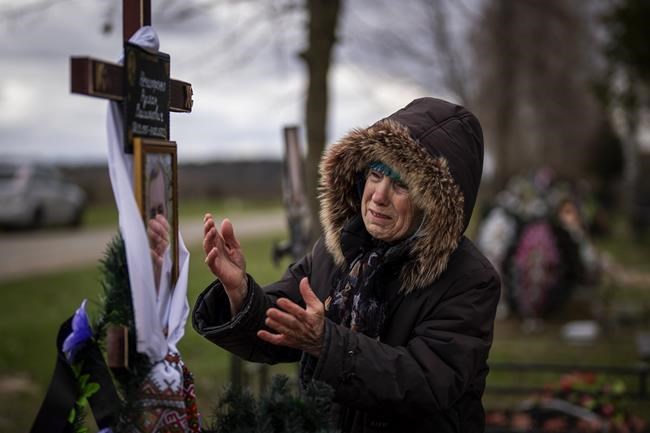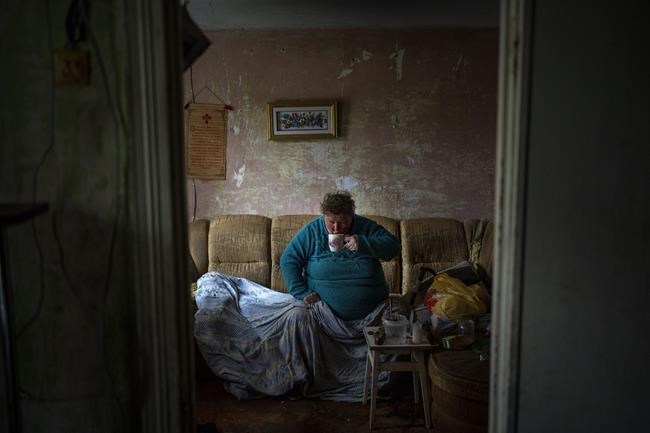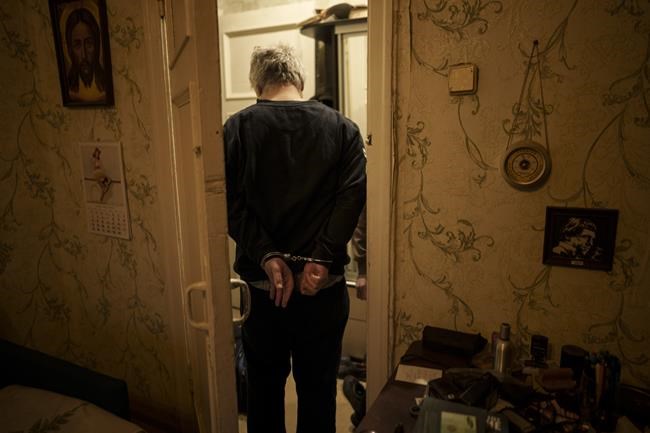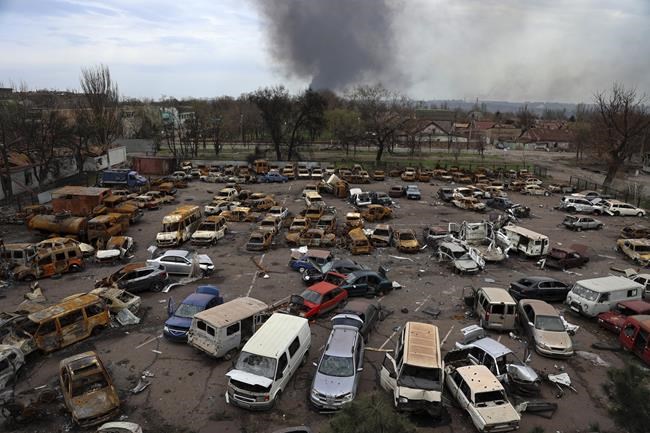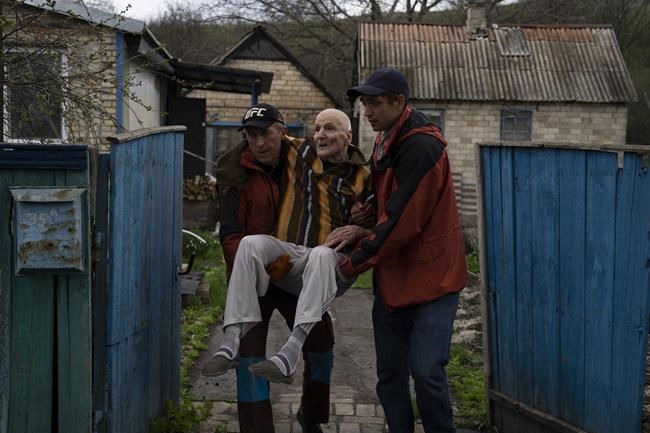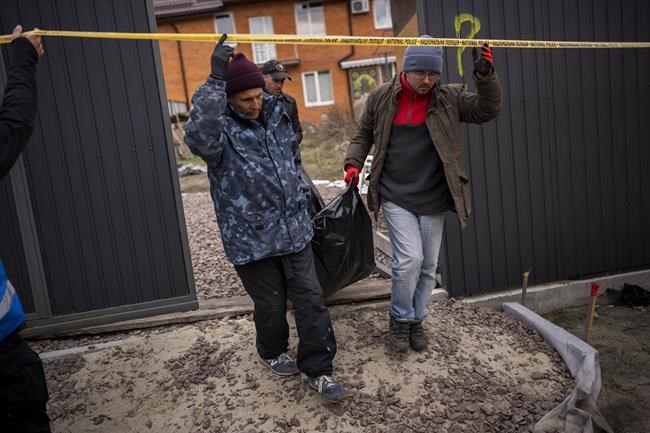Zelenskyy: Russian offensive in eastern Ukraine has begun
Advertisement
Read this article for free:
or
Already have an account? Log in here »
To continue reading, please subscribe:
Monthly Digital Subscription
$0 for the first 4 weeks*
- Enjoy unlimited reading on winnipegfreepress.com
- Read the E-Edition, our digital replica newspaper
- Access News Break, our award-winning app
- Play interactive puzzles
*No charge for 4 weeks then price increases to the regular rate of $19.00 plus GST every four weeks. Offer available to new and qualified returning subscribers only. Cancel any time.
Monthly Digital Subscription
$4.75/week*
- Enjoy unlimited reading on winnipegfreepress.com
- Read the E-Edition, our digital replica newspaper
- Access News Break, our award-winning app
- Play interactive puzzles
*Billed as $19 plus GST every four weeks. Cancel any time.
To continue reading, please subscribe:
Add Free Press access to your Brandon Sun subscription for only an additional
$1 for the first 4 weeks*
*Your next subscription payment will increase by $1.00 and you will be charged $16.99 plus GST for four weeks. After four weeks, your payment will increase to $23.99 plus GST every four weeks.
Read unlimited articles for free today:
or
Already have an account? Log in here »
Hey there, time traveller!
This article was published 18/04/2022 (1333 days ago), so information in it may no longer be current.
LVIV, Ukraine (AP) — Russia launched its long-feared, full-scale ground offensive to take control of Ukraine’s east on Monday, attacking along a broad front over 300 miles (480 kilometers) long, Ukrainian officials said in what marked the opening of a new and potentially climactic phase of the war.
“The Russian troops have begun the battle for the Donbas,” Ukrainian President Volodymyr Zelenskyy announced in a video address. He said a “significant part of the entire Russian army is now concentrated on this offensive.”
The Donbas is Ukraine’s mostly Russian-speaking industrial heartland in the east, where Moscow-backed separatists have been fighting Ukrainian forces for the past eight years and have declared two independent republics that have been recognized by Russia.

In recent weeks, the Kremlin declared the capture of the Donbas its main goal of the war after its attempt to storm Kyiv failed. After withdrawing from the capital, Russia began regrouping and reinforcing its ground troops in the east for an all-out offensive.
“No matter how many Russian troops are driven there, we will fight,” Zelenskyy vowed. “We will defend ourselves. We will do it every day.”
The offensive got underway after Russia bombarded the western city of Lviv and a multitude of other targets across Ukraine in what appeared to be an intensified bid to grind down the country’s defenses.
The Ukraine military’s general staff said Russian President Vladimir Putin’s forces were increasing assaults in the Luhansk and Donetsk regions — both of which are part of the Donbas — as well as in the area of Zaporizhzhia.
“This morning, almost along the whole front line of the Donetsk, Luhansk and Kharkiv regions, the occupiers attempted to break through our defenses,” Oleksiy Danilov, secretary of Ukraine’s national security council, was quoted as telling Ukrainian media. “Fortunately, our military is holding out. They passed through only two cities. This is Kreminna and another small town.”
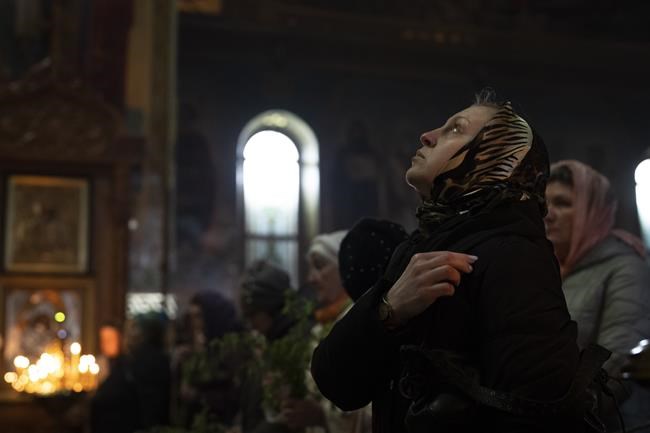
He added: “We are not giving up any of our territories.”
A Ukrainian military official said street battles had begun in Kreminna and that evacuation was impossible.
Luhansk regional military administrator Serhiy Haidai said heavy artillery fire set seven residential buildings on fire and targeted the sports complex where the nation’s Olympic team trains.
Haidai later told Ukrainian television that Russians took control of the city after “leveling everything to the ground,” so his forces retreated to regroup and keep on fighting.
Meanwhile, in the besieged southern port city of Mariupol, Denys Prokopenko, commander of the Azov Regiment of the Ukrainian National Guard that was holding out against Russian forces, said in a video message that Russia had begun dropping bunker-buster bombs on the Azovstal steel plant where the regiment was holed up.

The sprawling plant contains a warren of tunnels where both fighters and civilians are sheltering. It is believed to be the last major pocket of resistance in the shattered city.
At least seven people were reported killed in missile strikes on Lviv, a city close to the Polish border that has seen only sporadic attacks during almost two months of war and has become a haven for civilians fleeing the fighting elsewhere. To the Kremlin’s increasing anger, Lviv has also become a major gateway for NATO-supplied weapons.
The attack on Lviv hit three military infrastructure facilities and an auto shop, according to the region’s governor, Maksym Kozytskyy. He said the wounded included a child.
A Lviv hotel sheltering Ukrainians who had fled the fighting in other parts of the country was also badly damaged, Mayor Andriy Sadovyi said. The city has seen its population swell with elderly people, mothers and children trying to escape the war.
“The nightmare of war has caught up with us even in Lviv,” said Lyudmila Turchak, who fled with two children from the eastern city of Kharkiv. “There is no longer anywhere in Ukraine where we can feel safe.”
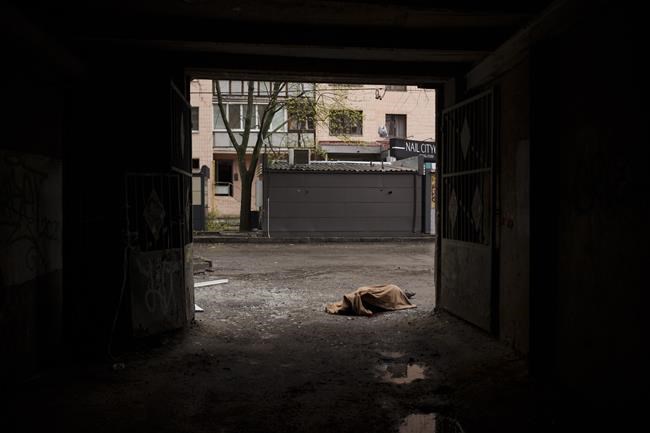
Lviv, the biggest city and a major transportation hub in western Ukraine, is about 80 kilometers (50 miles) from Poland, a NATO member.
Russia has strongly complained about the increasing flow of Western weapons to Ukraine and warned that such aid could have consequences. On Russian state media, some anchors have charged that the supplies amount to direct Western engagement in the fight against Russia.
A powerful explosion also rocked Vasylkiv, a town south of the capital of Kyiv that is home to an air base, according to residents. It was not immediately clear what was struck.
Kharkiv, Ukraine’s second-largest city, was hit by shelling that killed at least three people, according to Associated Press journalists on the scene. One of the dead was a woman who appeared to be going out to collect water in the rain. She was found with a water canister and an umbrella by her side.
Military analysts say Russia was increasing its strikes on weapons factories, railroads and other infrastructure ahead of its assault on the Donbas.
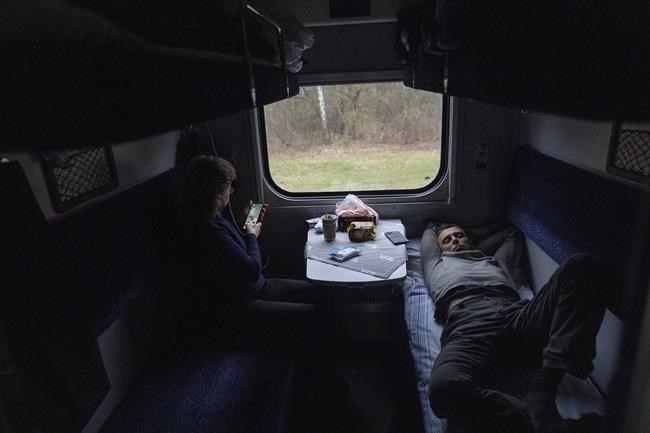
Moscow said its missiles struck more than 20 military targets in eastern and central Ukraine in the past day, including ammunition depots, command headquarters and groups of troops and vehicles.
It also reported that its artillery hit an additional 315 Ukrainian targets and that warplanes conducted 108 strikes on troops and military equipment. The claims could not be independently verified.
Gen. Richard Dannatt, a former head of the British Army, told Sky News that Russia was waging a “softening-up” campaign ahead of the Donbas offensive.
A senior U.S. defense official, speaking on condition of anonymity to discuss the Pentagon’s assessments of the war, said there are now 76 Russian combat units, known as battalion tactical groups, in eastern and southern Ukraine, up from 65 last week.
That could translate to around 50,000 to 60,000 troops, based on what the Pentagon said at the start of the war was the typical unit strength of 700 to 800 soldiers, but the numbers are difficult to pinpoint at this stage in the fighting.
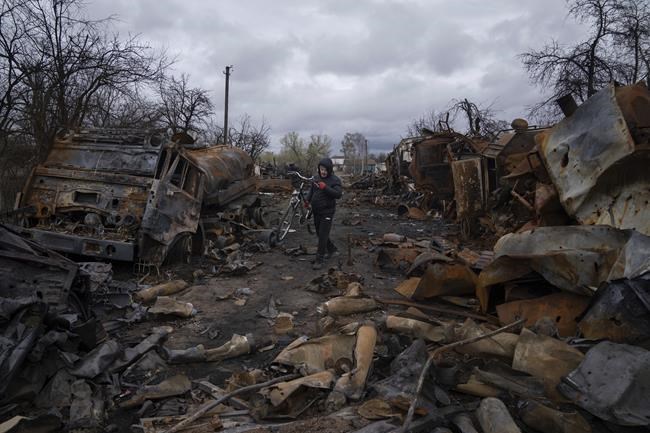
The official also said that four U.S. cargo flights arrived in Europe on Sunday with an initial delivery of weapons and other materials for Ukraine as part of a $800 million package announced by Washington last week. And training of Ukrainian personnel on U.S. 155 mm howitzers is set to begin in the next several days.
The capture of Mariupol, where Ukraine estimates 21,000 people have been killed, is seen as key, and not just because it would deprive Ukraine of a vital port and complete a land bridge between Russia and the Crimean Peninsula, seized from Ukraine from 2014.
The U.S. defense official said that if Russian forces succeed in taking full control of Mariupol, that could free up nearly a dozen battalion tactical groups for use elsewhere in the Donbas.
___
Associated Press journalists Nico Maounis and Philip Crowther in Lviv, Ukraine, Adam Schreck in Vasylkiv, Ukraine, and Robert Burns in Washington contributed to this report, as did other AP staff members around the world.
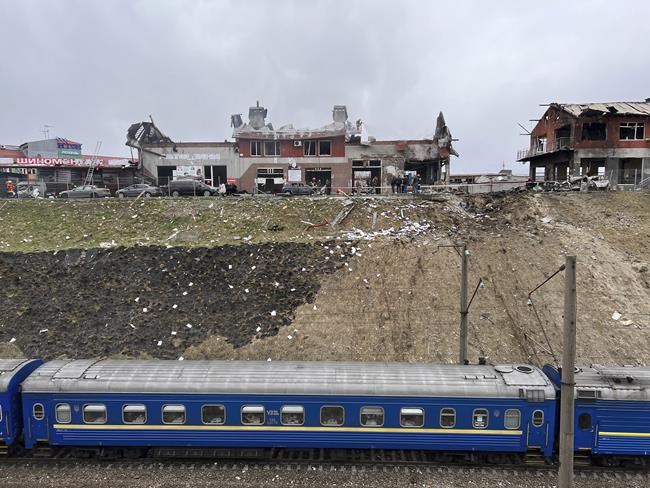
___
Follow the AP’s coverage of the war at https://apnews.com/hub/russia-ukraine
